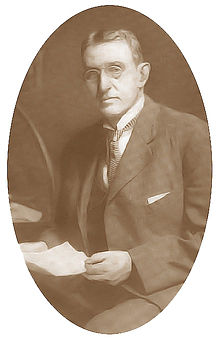George Howard Earle, Jr.
| George Howard Earle, Jr. | |
|---|---|
 |
|
| Born |
July 6, 1856 Philadelphia, Pennsylvania, United States |
| Died | February 19, 1928 (aged 71) Philadelphia, Pennsylvania, United States |
| Occupation | Lawyer Businessman |
|
|
|
| Signature | |
George H. Earle, Jr. (July 6, 1856 – February 19, 1928) was a Philadelphia lawyer and "financial diplomat" who was highly sought after to save ailing corporations from financial ruin.
Earle was born in Philadelphia, Pennsylvania. Grandson of noted abolitionist and philanthropist, Thomas Earle, and only son to Philadelphia lawyer and Mrs. Frances ("Fanny") Van Leer Earle, he gained notoriety for his abilities as a "business doctor"—having turned around many organizations from the brink of financial ruin after being appointed as receiver and reorganizer. A Harvard University graduate (1879), Earle became a member of the Philadelphia bar—following in his father's and grandfather's footsteps—practicing his trade as a lawyer in the firm of Earle & White in Philadelphia. But Earle would soon forsake the practice of law "save as a useful medicament to be employed in the cure of invalid companies, and as a study for the little indoor leisure that business leaves him." He would be appointed as president and director to nearly two dozen Philadelphia companies and corporations. Mr. Earle married Catharine H. French on 12 December 1881, two years after he graduated from Harvard. It was his desire to marry Miss French after he began earning at least five dollars a week, and his starting weekly salary at an attorney's office just fresh from college was only $2.50. They would have ten children in all, to include George Howard Earle III—former Governor (1935–1939) of Pennsylvania.
Along with his father, Earle was a member of the Committee of One Hundred (Philadelphia)—"a non-partisan effort in aid of good government" dedicated to ending bossism politics in Philadelphia in the late 1800s. This committee of reformers, consisting initially of Independent Republicans "seeking to reform the management of the Republican party," would eventually lose influence and effectiveness. According to When Bosses Ruled Philadelphia (McCafferty, 1993), among proposed reasons for their ineffectiveness was the resulting "division between reformers over the question of partisanship," "poor organization and their dislike of political activism," and the fact that it was "a self-constituted body that conducted political affairs in an autocratic manner," geographically isolated from the "bulk of the city's population"—Mr. Earle himself later remarked that it had been "essentially aristocratic in temperament." Despite the committee's failure to bring about a lasting, broad-scale influence in the city, Mr. Earle would continue to speak up for good government practices, and for the protection of political liberty for all Americans.
...
Wikipedia
